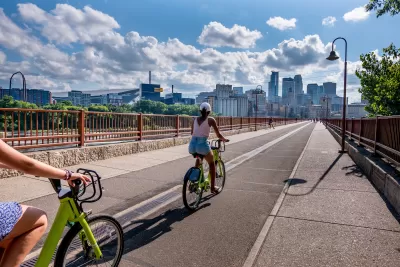A new report outlines ridership trends and the keys to success for bike and scooter share systems.

Ridership for shared mobility systems like e-scooters and bikes is on the rise after the pandemic slump, reports Dan Zukowski in Smart Cities Dive. “Riders took 113 million trips on shared bikes and e-scooters in the U.S. during 2022, according to a new report from the National Association of City Transportation Officials, setting a new high since the 2019 peak of 136 million rides.”
However, the report highlights concern due to “volatility amongst private-sector operators” and higher user costs. The report recommends that city leaders work with shared mobility providers to create “thoughtful pricing policies” and promote safe road infrastructure in their cities.
The NACTO report notes that closer collaboration with governments tends to yield better results, and “long-term contracts between municipalities and private operators yield more sustainable results, while companies with short-term permits easily pull out of cities when financial conditions deteriorate.”
Unsurprisingly, “Key to the success of shared micromobility systems are dedicated, protected bike lanes, NACTO says,” as well as affordable rates and reduced fare options for low-income riders.
FULL STORY: Shared bike, e-scooter use recovers from pandemic lows, but hurdles remain

Planetizen Federal Action Tracker
A weekly monitor of how Trump’s orders and actions are impacting planners and planning in America.

Maui's Vacation Rental Debate Turns Ugly
Verbal attacks, misinformation campaigns and fistfights plague a high-stakes debate to convert thousands of vacation rentals into long-term housing.

San Francisco Suspends Traffic Calming Amidst Record Deaths
Citing “a challenging fiscal landscape,” the city will cease the program on the heels of 42 traffic deaths, including 24 pedestrians.

Amtrak Rolls Out New Orleans to Alabama “Mardi Gras” Train
The new service will operate morning and evening departures between Mobile and New Orleans.

The Subversive Car-Free Guide to Trump's Great American Road Trip
Car-free ways to access Chicagoland’s best tourist attractions.

San Antonio and Austin are Fusing Into one Massive Megaregion
The region spanning the two central Texas cities is growing fast, posing challenges for local infrastructure and water supplies.
Urban Design for Planners 1: Software Tools
This six-course series explores essential urban design concepts using open source software and equips planners with the tools they need to participate fully in the urban design process.
Planning for Universal Design
Learn the tools for implementing Universal Design in planning regulations.
Heyer Gruel & Associates PA
JM Goldson LLC
Custer County Colorado
City of Camden Redevelopment Agency
City of Astoria
Transportation Research & Education Center (TREC) at Portland State University
Jefferson Parish Government
Camden Redevelopment Agency
City of Claremont





























